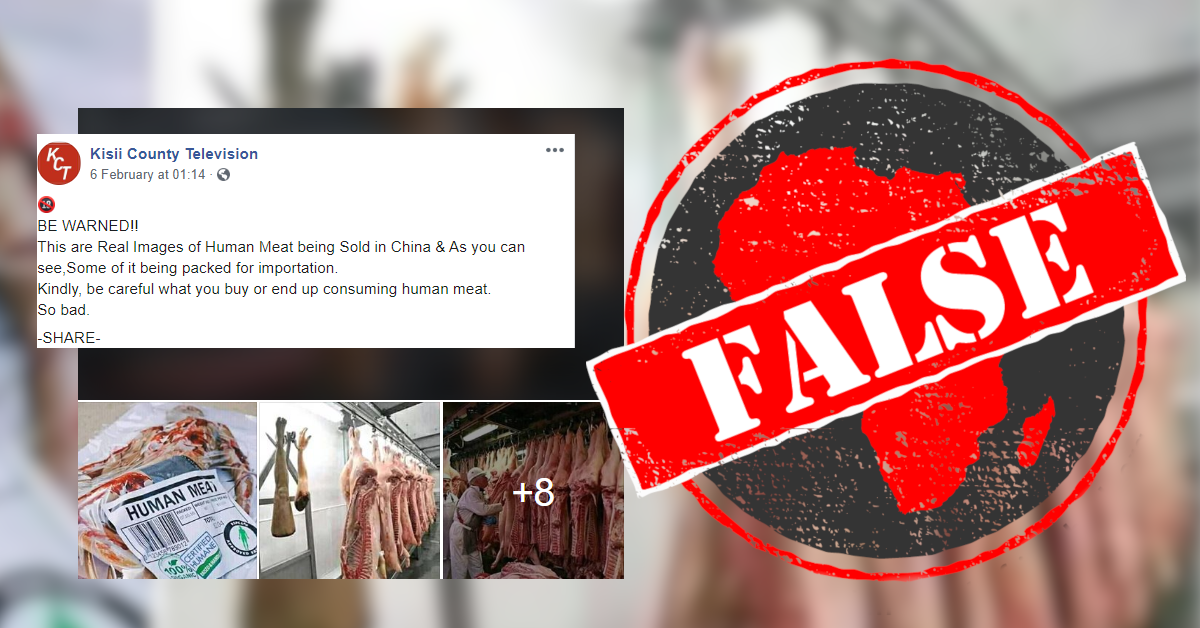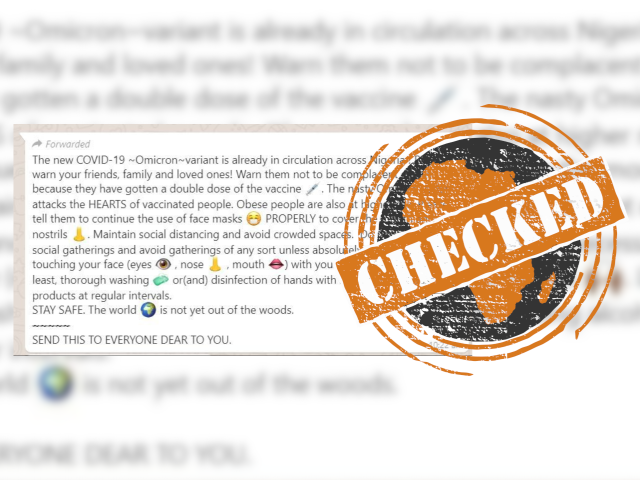Since the 2019 outbreak of the novel coronavirus, now named Covid-19, the state of public health in China has received global attention. And on 5 February 2020, a Kenyan Facebook account posted a series of shocking photos, claiming that Chinese butchers were selling human body parts.
“BE WARNED!!” the post on the Kisii County Television Facebook page says. “This are Real Images of Human Meat being Sold in China & As you can see,Some of it being packed for importation. Kindly, be careful what you buy or end up consuming human meat. So bad.”
The error-ridden text is a red flag. Correct grammar and spelling is standard for credible news reports. But is the grisly claim about human flesh true? We checked.

A series of reverse image searches shows that all 11 images in the Facebook post have different origins, and many are of everyday butcheries, which don’t sell human meat.
The two photographs of human-looking arms and legs are of a make-believe butchery that was created at the Smithfield meat market in London, United Kingdom, as part of an advertising campaign.
The video game company, Capcom, made the “butchery”, that sold edible meat resembling human body parts, while promoting a video game, Resident Evil 6, in 2012.
This event was widely covered in the media in 2012. A gaming-focused YouTube channel, CVG, even filmed a tour of the fake butchery before the game was launched.
The two photos that show people labelled as “human meat” and wrapped in plastic packaging were of an October 2016 animal-rights campaign by the organisation PETA Australia.
The photograph of a sliced steak in a pan was previously the subject of a complaint to the UK newspaper the Daily Mail in May 2015. According to food industry publications, the Hawksmoor, a fine dining restaurant in London, complained that the Daily Mail had used a photo of its steak to illustrate a story about a Nigerian restaurant in London that is supposed to have served human flesh.
The Daily Mail and BBC Swahili, both of whom reported the story, took it down and apologised.
Two of the photographs are of butchers at work at Smithfield meat market in London. One was taken in March 2013 by Oli Scarff, for Getty Images. We traced the other to a July 2010 blog post by Steve Gong, who took photographs of the meat market early one morning.
The photo of a meat seller wearing a face mask was originally taken by Peter Parks, a Sydney-based photographer for Agence France-Presse. It was taken in Hong Kong, in China, during the outbreak of severe acute respiratory syndrome (SARS) in April 2003.
The woman pictured selling meat while talking on the phone was photographed in Beijing, China, in 2016 by How Hwee Young for the European Pressphoto Agency.
We traced the photograph of a butcher looking away from the camera to a 15 October 2011 post by Donna Hull on her blog, My Itchy Travel Feet. According to metadata on her blog, Hull took the photo on 16 October 2009 in Hong Kong’s Kowloon district.
Finally, we searched for the picture of a woman selling meat at a stall, which is included in a number of posts about human meat allegedly being sold in China. The oldest reference on Tineye was a page on a Romanian website, discussing rising imports of meat from China, that is no longer online. However, when the URL (http://www.recolta.eu/thumbs/300-170-1/2014/04/30/importurile-de-carne-de-vita-din-china-in-continua-crestere-12729.JPG) is translated, it reads: “Beef imports from China are constantly increasing”
However, an archived post from January 2012 on the blog Alternativa per Pollenca used the image, where it appears to be attributed to the print edition of the newspaper El Temps, published in the Catalan language in Valencia, Spain. The caption reads as follows, according to Google Translate: “A beef market in Shanghai. Most investors do not care about products just buying and selling futures contracts”.
Africa Check has asked El Temps if the image is theirs and we will update this report with their response. However, evidence available suggests that this image, like all the rest, has nothing to do with human flesh. None of the photos in this Facebook post prove that human meat is being sold in China. – Vincent Ng’ethe
“BE WARNED!!” the post on the Kisii County Television Facebook page says. “This are Real Images of Human Meat being Sold in China & As you can see,Some of it being packed for importation. Kindly, be careful what you buy or end up consuming human meat. So bad.”
The error-ridden text is a red flag. Correct grammar and spelling is standard for credible news reports. But is the grisly claim about human flesh true? We checked.

Promoting a video game
A series of reverse image searches shows that all 11 images in the Facebook post have different origins, and many are of everyday butcheries, which don’t sell human meat.
The two photographs of human-looking arms and legs are of a make-believe butchery that was created at the Smithfield meat market in London, United Kingdom, as part of an advertising campaign.
The video game company, Capcom, made the “butchery”, that sold edible meat resembling human body parts, while promoting a video game, Resident Evil 6, in 2012.
This event was widely covered in the media in 2012. A gaming-focused YouTube channel, CVG, even filmed a tour of the fake butchery before the game was launched.
Photos from animal-rights protest and false news report
The two photos that show people labelled as “human meat” and wrapped in plastic packaging were of an October 2016 animal-rights campaign by the organisation PETA Australia.
The photograph of a sliced steak in a pan was previously the subject of a complaint to the UK newspaper the Daily Mail in May 2015. According to food industry publications, the Hawksmoor, a fine dining restaurant in London, complained that the Daily Mail had used a photo of its steak to illustrate a story about a Nigerian restaurant in London that is supposed to have served human flesh.
The Daily Mail and BBC Swahili, both of whom reported the story, took it down and apologised.
Real butcheries selling animal meat
Two of the photographs are of butchers at work at Smithfield meat market in London. One was taken in March 2013 by Oli Scarff, for Getty Images. We traced the other to a July 2010 blog post by Steve Gong, who took photographs of the meat market early one morning.
The photo of a meat seller wearing a face mask was originally taken by Peter Parks, a Sydney-based photographer for Agence France-Presse. It was taken in Hong Kong, in China, during the outbreak of severe acute respiratory syndrome (SARS) in April 2003.
The woman pictured selling meat while talking on the phone was photographed in Beijing, China, in 2016 by How Hwee Young for the European Pressphoto Agency.
We traced the photograph of a butcher looking away from the camera to a 15 October 2011 post by Donna Hull on her blog, My Itchy Travel Feet. According to metadata on her blog, Hull took the photo on 16 October 2009 in Hong Kong’s Kowloon district.
Spanish newspaper
Finally, we searched for the picture of a woman selling meat at a stall, which is included in a number of posts about human meat allegedly being sold in China. The oldest reference on Tineye was a page on a Romanian website, discussing rising imports of meat from China, that is no longer online. However, when the URL (http://www.recolta.eu/thumbs/300-170-1/2014/04/30/importurile-de-carne-de-vita-din-china-in-continua-crestere-12729.JPG) is translated, it reads: “Beef imports from China are constantly increasing”
However, an archived post from January 2012 on the blog Alternativa per Pollenca used the image, where it appears to be attributed to the print edition of the newspaper El Temps, published in the Catalan language in Valencia, Spain. The caption reads as follows, according to Google Translate: “A beef market in Shanghai. Most investors do not care about products just buying and selling futures contracts”.
Africa Check has asked El Temps if the image is theirs and we will update this report with their response. However, evidence available suggests that this image, like all the rest, has nothing to do with human flesh. None of the photos in this Facebook post prove that human meat is being sold in China. – Vincent Ng’ethe
Republish our content for free
For publishers: what to do if your post is rated false
A fact-checker has rated your Facebook or Instagram post as “false”, “altered”, “partly false” or “missing context”. This could have serious consequences. What do you do?
Click on our guide for the steps you should follow.
Publishers guideAfrica Check teams up with Facebook
Africa Check is a partner in Meta's third-party fact-checking programme to help stop the spread of false information on social media.
The content we rate as “false” will be downgraded on Facebook and Instagram. This means fewer people will see it.
You can also help identify false information on Facebook. This guide explains how.





Add new comment